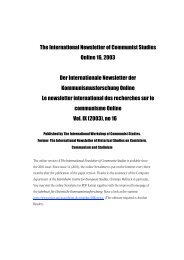VOL. XVI (2010), NO 23 - The International Newsletter of Communist ...
VOL. XVI (2010), NO 23 - The International Newsletter of Communist ...
VOL. XVI (2010), NO 23 - The International Newsletter of Communist ...
Erfolgreiche ePaper selbst erstellen
Machen Sie aus Ihren PDF Publikationen ein blätterbares Flipbook mit unserer einzigartigen Google optimierten e-Paper Software.
<strong>The</strong> <strong>International</strong> <strong>Newsletter</strong> <strong>of</strong> <strong>Communist</strong> Studies Online <strong>XVI</strong> (<strong>2010</strong>), no. <strong>23</strong> 12<br />
Russian historian and Memorial activist Nikita Petrov, which took place on December 10<br />
2009. It has been accompanied with the screening <strong>of</strong> a documentary film on Memorial and its<br />
activities.<br />
<strong>The</strong> Assassination <strong>of</strong> Radek and Sokol’nikov: Document Published in France.<br />
In a documentary appendix to his biography <strong>of</strong> KGB head Ivan Serov (Ivan Serov. Pervyi<br />
predsedatel’ KGB, Moskva, Materik, 2005), Nikita Petrov published an internal report written<br />
by Serov in 1956, which confirms that the Bolshevik oppositionists Karl Radek and Grigorii<br />
Sokol’nikov were murdered by NKVD agents infiltrated into the prison because they talked<br />
too much about their trial. In 2009, the report was translated into French and published in<br />
Cahiers du Mouvement Ouvrier, N° 43, pp. 83-86. <strong>The</strong> issue can be obtained at<br />
http://www.trotsky.com.fr/.<br />
Pobeda 1941-1945. Russian Photo Archives on World War II.<br />
<strong>The</strong> Russian archival portal “Arkhivy Rossii” (http://www.rusarchives.ru) has launched a subportal<br />
called <strong>The</strong> Victory: 1941-1945 (Pobeda. 1941-1945). It is available online at<br />
http://victory.rusarchives.ru, and contains 1638 photographic documents on World War II<br />
from a Soviet perspective, digitized with the participation <strong>of</strong> over 100 federal and regional<br />
archives in Russia. Eventhough the site’s primary aim seems to underline the victorious<br />
engagement <strong>of</strong> the Soviet Union in World War II, and despite the topical categorisation, it is a<br />
highly valuable resource, since it not only puts online previously unknown WWII visual<br />
sources, but also states the exact archival signature with each photo, making the documents<br />
fully citeable in scholarly research. Thus the site may be considered a finding aid on WWII<br />
photography in Russian archives.<br />
Fundação Amílcar Cabral/ Fundação Mário Soares: Memory <strong>of</strong> the Tarrafal<br />
Concentration Camp in Cape Verde.<br />
In the context <strong>of</strong> the organization <strong>of</strong> an <strong>International</strong> Symposium about the Portuguese<br />
concentration camp <strong>of</strong> Tarrafal (28.4.-1.5.2009), the Mario Soares Foundation and the<br />
Amilcar Cabral Foundation opened a combined website publishing online the principal items,<br />
documents and illustrations <strong>of</strong> the exposition opened in Tarrafal at this occasion. <strong>The</strong><br />
exposition was opened by the Premier <strong>of</strong> Cape Verde, José Maria Neves, who asked for a<br />
joined effort to convince the UNESCO to recognize the camp as "patrimony <strong>of</strong> mankind". <strong>The</strong><br />
"camp <strong>of</strong> the slow death" ("campo de morte lenta”) was situated at the island <strong>of</strong> Santiago and<br />
created under the Portuguese dictator Salazar. In a first period from 1936 to 1954 it was<br />
mainly directed against Portuguese antifascists and from 1961 to 1974 against the members<br />
<strong>of</strong> the liberation movements <strong>of</strong> Angola, Guinea-Bissau and Cape Verde. Among the 32 who<br />
died in the camp were anarchists and communists, like the general secretary <strong>of</strong> the<br />
<strong>Communist</strong> party, Bento Gonçalves. <strong>The</strong> most important illegal resistance group within the<br />
prisoners was the "Organização Comunista Prisional" (OCP, controlled by the <strong>Communist</strong><br />
Party <strong>of</strong> Portugal), followed by the "Organização Libertária Prisional" (OLP). <strong>The</strong> duty <strong>of</strong><br />
memory is described as the main aim <strong>of</strong> the website: "Moreover, the understanding <strong>of</strong> the<br />
importance <strong>of</strong> the historical legacy now evoked demands the consolidation <strong>of</strong> a museological<br />
project in Tarrafal – that preserves and keeps alive the memory <strong>of</strong> the common fight <strong>of</strong> the<br />
peoples from Portugal, Angola, Guinea-Bissau and Cape Verde, that must be extended to














